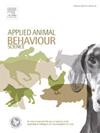训练水平和性格对边境牧羊犬在自然探测任务中的嗅觉表现有影响
IF 2.2
2区 农林科学
Q1 AGRICULTURE, DAIRY & ANIMAL SCIENCE
引用次数: 0
摘要
为了能够将研究结果推广到作为一个物种的狗身上,许多研究使用混合样本,但使用单一品种样本可以调查几个影响因素,而不会产生品种的混淆效应。为了揭示内因和外因因素对嗅觉表现的影响,我们研究了年龄、个性特征(活动/兴奋性和训练反应性)、注意力不集中、多动和冲动、训练水平和主人奖励风格测试对101只边境牧羊犬在自然探测任务中的表现的影响。我们分析了89个通过基线标准的个体的数据集,同时寻找隐藏的食物作为增加难度级别的奖励。我们发现,年长的狗不如晚熟的小狗成功,这与之前的研究结果一致,即年长的狗比年轻的狗表现得更差。与其他研究类似,某种程度的训练对表现有积极影响;即使是基本服从的狗也比没有受过训练的狗表现得更好,但受过高级或特殊嗅觉训练的狗并不比没有受过训练的狗表现得更好。训练反应性得分较高、活动/兴奋性得分较低的狗更成功。注意力不集中、多动和冲动得分以及主人的一般奖励方式对表现没有影响。通过专注于单一品种,而不是一大群狗,我们可以更好地识别不同训练水平和某些人格特征对嗅觉表现的影响,而不是混合样本。我们的研究强调了在任何任务情境中获得经验的重要性,以及某些性格特征,可以提高狗的嗅觉表现。本文章由计算机程序翻译,如有差异,请以英文原文为准。
Training level and personality affect border collies’ olfactory performance in the Natural Detection Task
To be able to generalise findings to dogs as a species, many studies use a mixed sample, but applying a single breed sample enables the investigation of several influencing factors without the confounding effect of breed. Here, to reveal the effect of some intrinsic and extrinsic factors on olfactory performance, we investigated the effects of age, personality traits (Activity/Excitability and Responsiveness to training), inattention, hyperactivity and impulsivity, training level, and owner’s rewarding style testing 101 border collies’ performance in the Natural Detection Task. We analysed the dataset of 89 individuals that passed the baseline criteria, while searching for hidden food as a reward at increasing difficulty levels. We found that senior dogs were less successful than late puppies, which is in line with previous findings, where older dogs performed worse than young adults. Some level of training positively affected performance, similar to other studies; even dogs with basic obedience performed better than those with no training, but dogs with advanced or special olfactory training were not superior. Dogs with higher Responsiveness-to-training scores and lower Activity/Excitability scores were more successful. Inattention, hyperactivity, and impulsivity scores and the owner’s general rewarding style did not affect the performance. By focusing on a single breed, instead of a large pool of dogs, we could better identify the influencing effects of different training levels and some personality traits on the olfactory performance than in a mixed sample. Our study highlights the importance of how experience gained in any task situation, as well as certain personality traits, can improve a dog's olfactory performance.
求助全文
通过发布文献求助,成功后即可免费获取论文全文。
去求助
来源期刊

Applied Animal Behaviour Science
农林科学-行为科学
CiteScore
4.40
自引率
21.70%
发文量
191
审稿时长
18.1 weeks
期刊介绍:
This journal publishes relevant information on the behaviour of domesticated and utilized animals.
Topics covered include:
-Behaviour of farm, zoo and laboratory animals in relation to animal management and welfare
-Behaviour of companion animals in relation to behavioural problems, for example, in relation to the training of dogs for different purposes, in relation to behavioural problems
-Studies of the behaviour of wild animals when these studies are relevant from an applied perspective, for example in relation to wildlife management, pest management or nature conservation
-Methodological studies within relevant fields
The principal subjects are farm, companion and laboratory animals, including, of course, poultry. The journal also deals with the following animal subjects:
-Those involved in any farming system, e.g. deer, rabbits and fur-bearing animals
-Those in ANY form of confinement, e.g. zoos, safari parks and other forms of display
-Feral animals, and any animal species which impinge on farming operations, e.g. as causes of loss or damage
-Species used for hunting, recreation etc. may also be considered as acceptable subjects in some instances
-Laboratory animals, if the material relates to their behavioural requirements
 求助内容:
求助内容: 应助结果提醒方式:
应助结果提醒方式:


